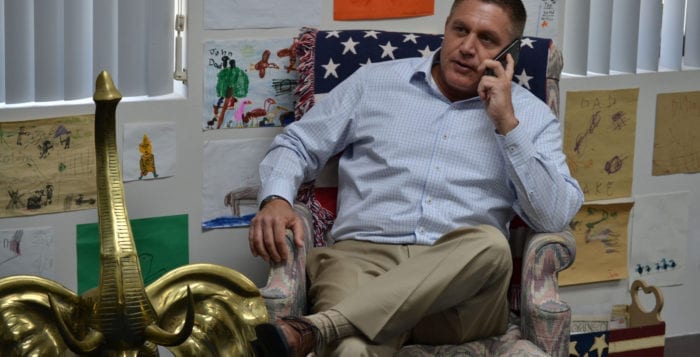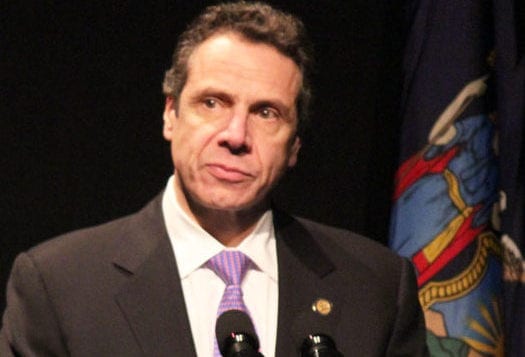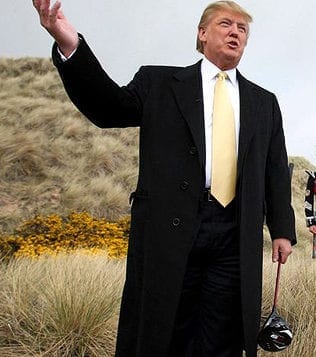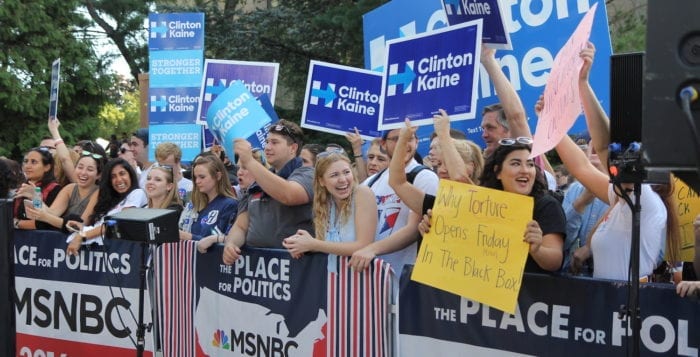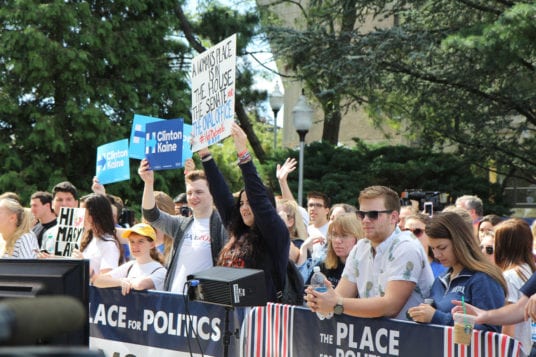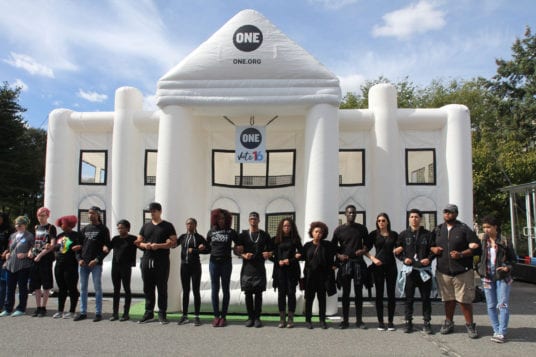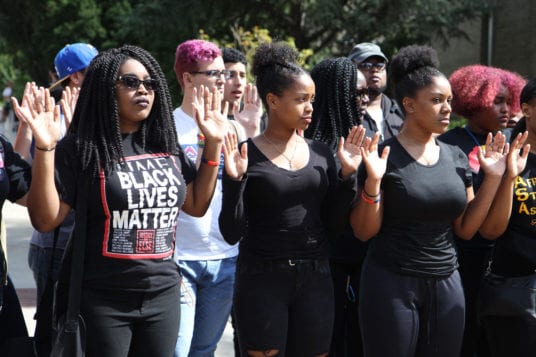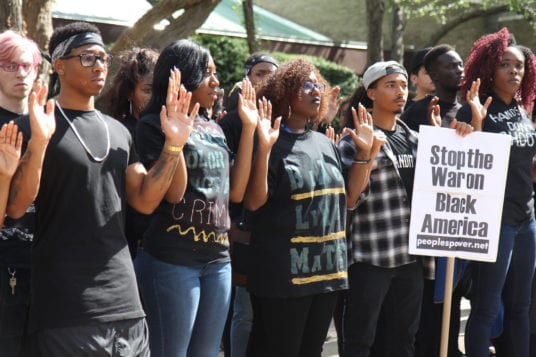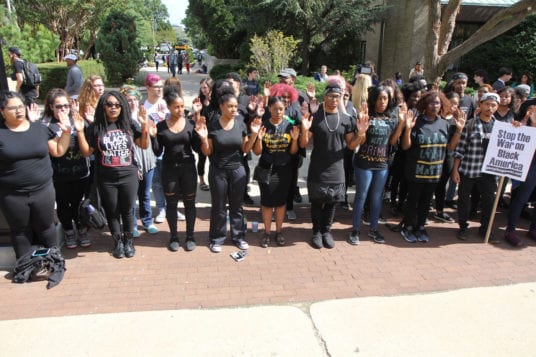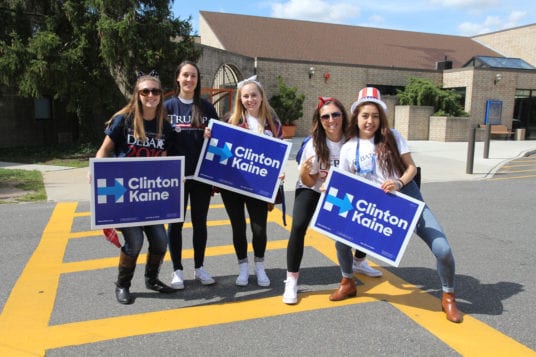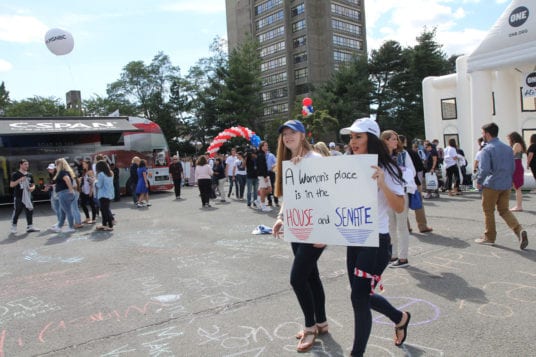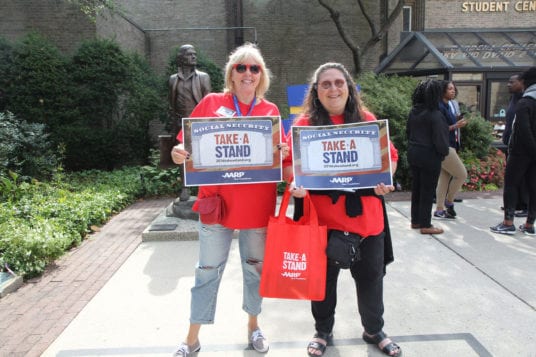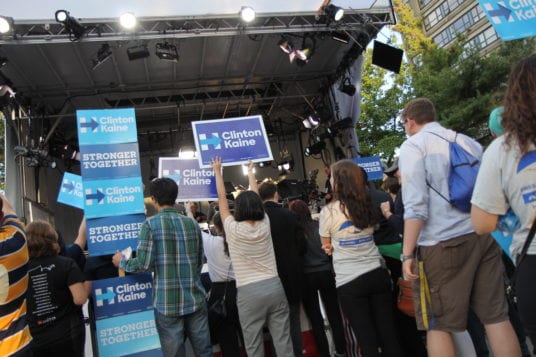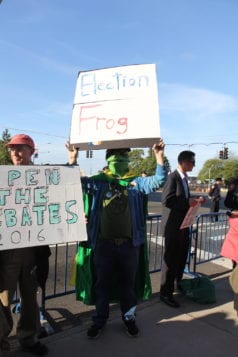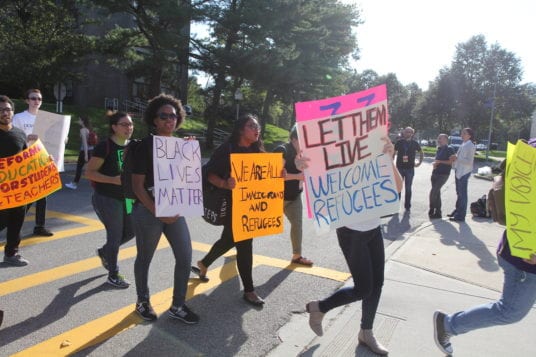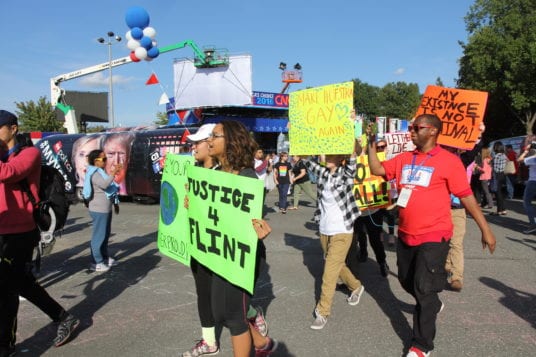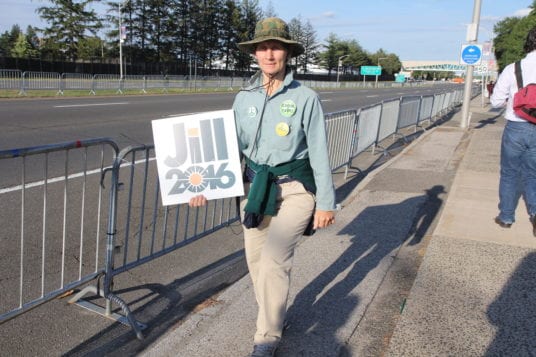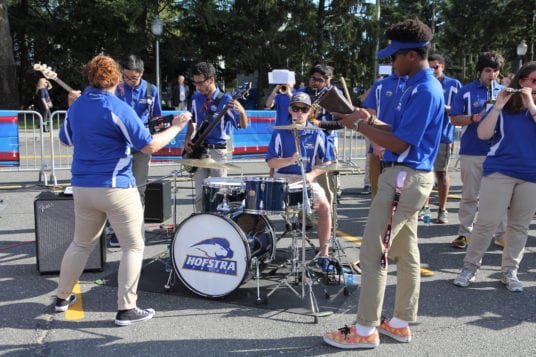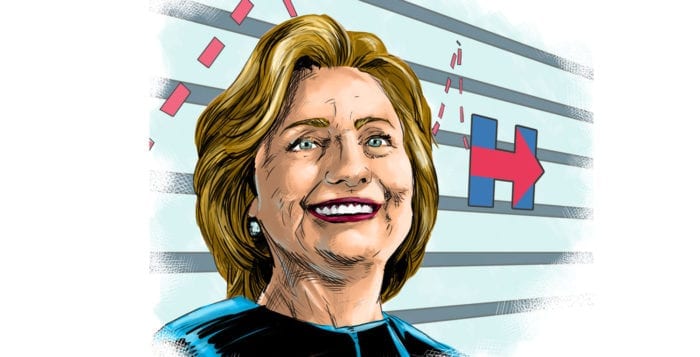A Republican hadn’t won Suffolk County in 24 years. The 2016 presidential election was out of the ordinary on dozens of levels, a fact that propelled Donald Trump to the presidency and helped him to become the first Republican candidate to win Suffolk County since George H.W. Bush in 1992. Trump received just 36.5 percent of the vote in New York state, though 52.5 percent of Suffolk voters selected the first-time political candidate. John Jay LaValle — arguably the most influential Republican in Suffolk politics — played a massive role in securing that victory.
During an exclusive interview at his Holtsville office April 18, the Suffolk County Republican Committee Chairman shed light on Trump’s surprising victory locally and nationally, his life in politics, serving as a Trump surrogate and the future of the party.
The state of the party
LaValle, 49, who has been in his current position since 2009, endorsed Trump about a year ago during a campaign event in Bethpage, calling him the most important presidential candidate in modern history.
“I wasn’t happy over the last several years on how the Republican Party — let’s say over the past decade — how the party dealt with the Obama Administration,” LaValle, an attorney by trade, said, sitting at his desk, his eyes glancing up intermittently at a muted television fixed on Fox News throughout the conversation. He said the GOP’s singular purpose, to its detriment, had become opposing former President Barack Obama (D). “We’d become a party without a compass. We didn’t have a purpose.”
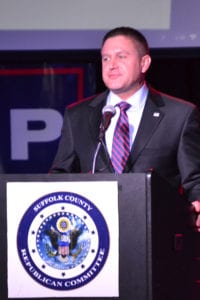
He added he thought it was a mistake for the party to be so focused on social issues, especially because public sentiment was heading in the opposite direction from the traditional Republican ideologies on most.
By the time of his formal endorsement April 9 at that Bethpage rally, only Trump, U.S. Sen. Ted Cruz (R-Texas) and Ohio Gov. John Kasich (R) were still alive in the Republican primary process, though LaValle said he made his decision to endorse Trump when he was still in a field of 17 candidates.
“I’m from…what someone would consider to be the establishment of the Republican Party,” LaValle said. “So when I came out and endorsed Donald Trump everyone was like, ‘what?’ And even people, my own cousin, was like ‘what are you doing?’ Everyone thought I was crazy. But one of the things that very much attracted me to Donald Trump was that I really thought that he would be someone that would perform a radical change to the Republican Party.”
LaValle’s cousin is New York State Sen. Ken LaValle (R-Port Jefferson), a mainstay in the state senate since 1976. Both are residents of Port Jefferson.
The chairman bought what Trump was selling, and encouraged Suffolk voters to do the same. He said Trump’s position that the government was “broken” and needed an outsider to fix it resonated for him, and believes it’s what voters liked about him locally.
“When I became a councilman in Brookhaven Town in 1996, the dominant issue was illegal immigration, and its effect on the housing,” he said. LaValle would later go on to be the youngest supervisor in Brookhaven’s history. In 2001 he took control at just 33 years old. “So here I was now in 2016, 20 years later and the dominant issue is still illegal immigration.”
LaValle said both Republicans and Democrats had squandered opportunities to make meaningful changes to immigration legislation, which is evidence of an inability in traditional politicians to get things done for their constituents in other areas, like creating jobs and jump-starting the economy.
Trump’s win has put a strain on the Republican Party and clouded its future, especially in light of record low approval ratings so early in his tenure. “Transformation” and “splintering” were two words LaValle didn’t deny were appropriate descriptors of the status of the party at the moment, though he said a polarization of politics is wreaking havoc on both parties.
He likened what’s going on now in the party to his days as Brookhaven Supervisor. He said he accomplished things that were atypical of Republican beliefs at the time, like enacting a $100 million Environmental Bond Act. He also said he was proud of actions he took like appointing women and African-Americans to leadership roles in the town — he named Cecile Forte, an African-American woman, the chair of the zoning board; and Marvin Colson, an African-American man the chair of the planning board — and consolidating town operations to a centralized location in Farmingville, where Brookhaven headquarters still stands.
“There’s…four different parties in this country right now instead of two, and while the liberals are trying to move the Democratic Party left, the conservatives are trying to pull the Republican Party right — it’s a very messy situation in the country,” he said. “You may look back 20 years from now and look at this particular time period in American history as a time period that actually created four major political parties in America. You can’t be a moderate on either side and be with the wings. It’s been too polarized.”
Although he said his job doesn’t entail influencing legislators about policy, the possibility of a splintering of the Republican Party could raise difficult questions for “establishment” Republican lawmakers who don’t join LaValle in subscribing to the book of Trump.
LaValle suggested Trump’s Supreme Court nomination, efforts to repeal and replace the Affordable Care Act and some other early signs bear this out — Trump campaigned to the right but is governing from a more moderate platform.
“Everyone thought I was crazy…I really thought that he would be someone that would perform a radical change to the Republican Party.”
— John Jay LaValle
“He doesn’t give a [expletive] about Republicans and Democrats and all that,” LaValle said of the president. “In fact, he was a Democrat. Then he became a Republican, but he was a moderate Republican. Then when he was running he became a very conservative Republican. From day one, I recollect him saying to me, ‘there’s only two things I want to do — I want to fix the economy and I want to get rid of this terrorism.’ He goes, ‘the rest of it, I could care less about.’”
The Trump presidency
Despite the missteps and uneasiness that have been hallmarks of Trump’s first 100 days in office, LaValle seemingly has no inclination to reverse course and distance himself from the president.
“I don’t criticize the boss in public,” he said.
After he endorsed Trump he went on to do about 160 television appearances as a surrogate for his candidate during 2016.
The chairman said he first met Trump several years ago when the businessman was considering a run for governor of New York, though little came of that meeting. The two met for the second time during the rally in Bethpage in 2016. Since, the two have spoken regularly by phone, and LaValle said he’d sat in on meetings at Trump Tower in the past, and even weighed in on policy when called upon by the man who currently occupies the highest office in the land.
“He runs his meetings like a game show — it’s phenomenal,” LaValle said. He told a story of the first time Trump called him on his cellphone and asked him to come to Manhattan for a meeting. LaValle said his friends instructed him to keep quiet, prepare to listen and limit his contribution to the meeting to “hello, Mr. Trump” and “goodbye, Mr. Trump.” Instead, LaValle said Trump repeatedly pressed him and others in the room for input on policy and issues, and he felt Trump genuinely listened to others’ opinions. LaValle said he once asked Trump why he valued his opinion so much.
“I trust you, and until you fail me that’s it, I’m going to rely on you,’” the chairman said Trump told him. That trust can be traced to a promise LaValle made to Trump in April 2016 after a campaign event at The Emporium in Patchogue, when he pledged to deliver Suffolk County for Trump during the Republican primary.
“When he was leaving he was telling me ‘oh you know what it cost me to come here? You know what I had to give up?’ I said ‘no, I appreciate that Mr. Trump, and I’m going to tell you right now — Suffolk County will be the number one county for you in the state of New York next Tuesday,’” LaValle said. “He said ‘well I’m going to hold you to that.’ I said ‘good, and I’m going to deliver.’ And we did. And he appreciated that.”
More than 72,000 Suffolk County residents chose Trump on primary day, to just 18,000 and 9,000 respectively for Kasich and Cruz.
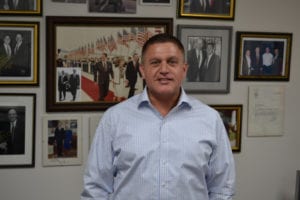
On another occasion, LaValle was forced to justify comments he made on CNN when he was asked to defend two “diametrically opposed” statements Trump had previously made.
“So my phone rings and he says, ‘what’s this about me evolving?’ And this is classic Donald Trump, by the way,” LaValle said. “So I said, ‘uh, excuse me?’ He goes ‘evolving, John — what’s this about me evolving? I’m watching TV and I hear you say that I’m evolving.’”
LaValle, laughing, said he thought he’d handled the situation beautifully.
“‘John, John, John — I’m not evolving. I’m running for president of the United States of America. I’m not evolving,’” he said Trump told him. “I said ‘well I understand sir, but what would you like me to say?’ He says ‘what would I like you to say? You say Donald Trump is the greatest candidate ever to run for president in the history of the United States.’”
LaValle said he later heard Kellyanne Conway, a key player in Trump’s campaign, use the word “evolving” on television, so he knew Trump was just blowing off steam at the time.
According to LaValle, another byproduct of the Trump presidency has been a head-on confrontation with debilitating political correctness, an aspect of Trump’s persona and platform that the chairman has found invaluable.
The chairman blamed gang violence on Long Island and heroin abuse to political correctness brought about by the Democrats.
“He’s made it okay to kind of tell it like it is — or at least like you see it,” LaValle said. “That was a big problem. In our country, we had gotten so bad at being politically correct that we weren’t allowed to like, even say certain things that were true.”
Attributing the rise of heroin abuse on Long Island to political correctness because of a lack of adequate border security addresses illegal drugs entering the country, but not a growing demand at home, which can be traced back to overprescribing of powerful pain medications, which then leads to heroin when prescriptions dry up.
The chairman offered strong defenses for Trump on issues that few have felt inclined to rush to justify — like supposed ties between the Russian government and Trump’s campaign, transition team and administration. He said the president hasn’t deviated from anything he’s said publicly about Russia. His desire has always been to improve relations, and contacts between his team and Russia make sense in striving to achieve that goal. When asked why the knee-jerk reaction from several associates is to deny said communications, LaValle said the media is granted no prior assumption that sources will respond to questions truthfully, though he said anyone who didn’t given honest answers is “destroying their credibility.”
Although LaValle insisted he didn’t criticize the boss in public, it’s not hard to take that concept and juxtapose it with the fact Trump has had issues as a result of publicly making false statements. The president said he won the most Electoral College votes (306) since President Ronald Reagan — in fact Obama won 332 four years ago and 365 in 2008, and going back to a Republican president Bush senior received more than Trump as well.
He walked the line on the comments Trump was caught on tape making to Billy Bush for Access Hollywood during a candid conversation neither party knew was being recorded.
“I mean I do feel bad that he got, kind of like set up, caught on tape with that whole grabbing thing,” he said. “I mean, I know so many guys that have said stupid things in their lifetime. We always just have the benefit of no one’s paying attention. And I’m not saying it’s right to do, don’t get me wrong, but that sucked for him to be caught on tape saying that.”
Even though he sympathized with Trump, he said earlier he understands why Trump’s own words could create a negative perception.
“It’s America, I guess they can do it. But it doesn’t make them any less sleazy and sleaze balls that they are. That’s what they’re doing. To me it’s a disgrace.”
— John Jay LaValle
“Saying Rosie O’Donnell is a fat slob, the stuff with Megyn Kelly, no, I could understand why there’s a perception that he’s a sexist, because he said things that are not appropriate,” he said.
In the beginning of the interview, LaValle described Trump as a brilliant businessman who understood he could say “something stupid just for the hell of it…he knew that’s the price he had to pay to get all of that free media,” and lauded him for “telling it like it is.”
Suffolk County
U.S. Rep. Lee Zeldin (R-Shirley) has taken small steps to distance himself from the president of late, though unless something drastically changes, the race for his seat in the House as representative for New York’s 1st Congressional District in 2018 will serve as a referendum on the party of Trump in Suffolk County.
After upsetting U.S. Rep. Tim Bishop (D-Southampton), who held the seat from 2003 to 2014, Zeldin defeated Anna Throne-Holst (D-Southampton) by 18 points to retain his seat in 2016. Zeldin’s big win was seen as an indicator of Trump’s success in the county because he was a strong supporter of Trump in 2016. Zeldin even proclaimed from the podium after the race was called on election night that he was excited to have the chance to “make America great again.”
Zeldin’s proximity to Trump has caused an uprising of some 1st District constituents since the election, with protests occurring throughout the past few months and demands for more access to the congressman. Still, LaValle isn’t concerned about Zeldin’s chances for reelection in 2018.
“Lee Zeldin is going to win big time in 2018,” he said. “I think the Democrat Party has shown itself to be frauds, crybabies, snowflakes and sore losers… It’s all a fraud. It’s not about — this isn’t a grassroots effort. These people are professionals. They’re being paid to be there and to organize individuals to disrupt town hall meetings of our duly elected representatives.”
Politico, an American political-journalism company has maintained there is zero evidence of protestors being paid. This rhetoric may seem familiar to some, as powerful Democratic leaders once made the same claim a few years back. House Minority Leader Nancy Pelosi said in 2009 Tea Party protestors disrupting town halls were funded by “the high end,” calling it “Astroturf,” meaning not an authentic grassroots movement, but something supported by benefactors.
“These people are a disgrace,” LaValle continued about the protestors. “It’s America, I guess they can do it. But it doesn’t make them any less sleazy and sleaze balls that they are. That’s what they’re doing. To me it’s a disgrace.”
In a phone interview, Zeldin said LaValle has been a strong ally during his political career. He also praised the job LaValle has done since taking over, noting a large shift in town and county seats in elected positions from blue to red during LaValle’s tenure, which he said the chairman played a role in.
“John is someone who can easily motivate a packed room of volunteers to want to campaign just a little harder and dig down a little bit deeper to help get across the finish line,” he said.
LaValle has been rumored to be a candidate to oppose Suffolk County Executive Steve Bellone (D) when he seeks reelection. He criticized the job Bellone has done in the position, saying the county’s finances have been “horribly mismanaged,” and said he doesn’t think Bellone is right for the job, though he didn’t offer any insight on his future aspirations.
“I don’t know what the future holds, but I’ll know it when it happens,” LaValle said. “The one thing I learned is I would have never expected to have done what I did last year in a million years. It was just something that I probably never would even have fathomed. So one thing that I learned is don’t ever try to make your plans too specific. Keep it loose, keep it fluid and be ready for something exciting. I know one thing, it’s going to be something exciting and it’s going to be something big.”

